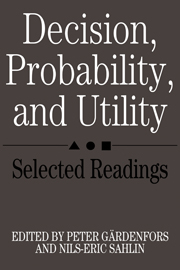Book contents
- Frontmatter
- Contents
- List of contributors
- Preface
- 1 Introduction: Bayesian decision theory – foundations and problems
- Part I Foundations of Bayesian decision theory
- Part II Conceptualization of probability and utility
- Part III Questionable rules of rationality
- Part IV Unreliable probabilities
- Part V Causal decision theory
- References
- Name index
- Subject index
Part IV - Unreliable probabilities
Published online by Cambridge University Press: 05 June 2012
- Frontmatter
- Contents
- List of contributors
- Preface
- 1 Introduction: Bayesian decision theory – foundations and problems
- Part I Foundations of Bayesian decision theory
- Part II Conceptualization of probability and utility
- Part III Questionable rules of rationality
- Part IV Unreliable probabilities
- Part V Causal decision theory
- References
- Name index
- Subject index
Summary
One of the fundamental assumptions for the classical form of Bayesianism is that the decision maker's beliefs can be represented by a unique probability distribution. This assumption was named A3 in the introduction. The best known argument in favor of it is the so-called Dutch book theorem. However, there are also a number of strong arguments against this assumption.
Some of the examples discussed in Part II of this volume seem to indicate that there are decision situations which are identical in all aspects relevant to a Bayesian decision maker, but which nevertheless motivate different decisions. Even if the probabilities involved are the same, the reliability of the information affects the choices. We decide differently depending on the type of information available. There is a clear difference between situations where we have scanty information about the events involved (e.g., the event of a bus strike in Verona, Italy, next month) and situations where we have more or less complete knowledge of the random processes involved (e.g., the event of drawing a ball from an urn).
It is important to bear in mind that the unreliability of probability information is not connected with the problem of how exactly to determine the subjective probabilities. The second problem, which was discussed in Hacking's article in Part II of this volume, is a measurement problem dealing with the clarity of probability perception; the unreliability problem is epistemological dealing with the quality of information underlying the probability assessments.
- Type
- Chapter
- Information
- Decision, Probability and UtilitySelected Readings, pp. 241 - 244Publisher: Cambridge University PressPrint publication year: 1988



